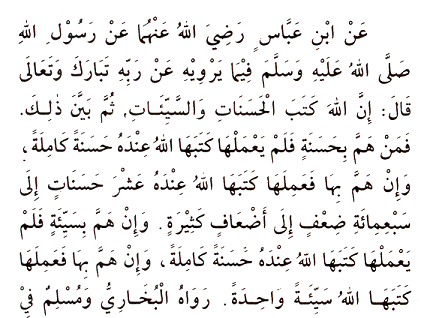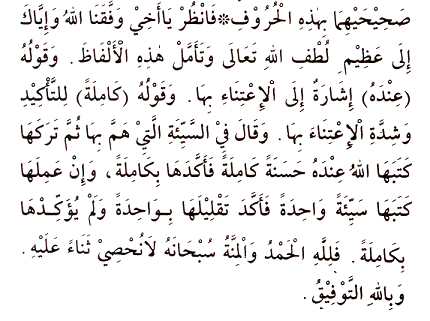

|
|
[This page was last updated: 26/10/02]


Ibn Abbas, radiyallahu 'anhu, reported that the Messenger of Allah, sallallahu 'alayhi wasallam, related from his Lord (glorified and exalted be He):
"Verily Allah has recorded the good deeds and the evil deeds." Then he clarified that: "Whosoever intends to do a good deed but does not do it, Allah records it with Himself as a complete good deed; but if he intends it and does it, Allah records it with Himself as ten good deeds, up to seven hundred times, or more than that. But if he intends to do an evil deed and does not do it, Allah records it with Himself as a complete good deed; but if he intends it and does it, Allah records it down as one single evil deed."
[Al-Bukhari
& Muslim]
Each in his Sahih have thus related it in these words:
"So look! My brother, may Allah help us, and take note
of how great is the kindness of Allah - may He be exalted! Reflect on
this, how that His saying "with Himself" points to His great
care with regard to it, and His saying "complete" is for emphasis,
not to point to the intensity of His care with regard to it. With regard
to the evil deed which one intended but then abandoned, He says: "Allah
records it with Himself as a complete good deed", emphasising this
by the word "complete" (kamilah); whereas if he performs
it, He records it down as "one evil deed", where by the word
"one" He emphasises its being made little of, since He does
not emphasise it here by the word "complete". So to Allah be
praise and grace. Glory be to Him! Our praises to Him we cannot count.
With Allah is success."
background
This hadith is considered as a Hadith Qudsi even though the text of the hadith does not show that clearly or explicitly. The hadith with this text is a clarification from the part of Prophet Muhammad, sallallahu 'alayhi wasallam, about the way of recording deeds. There are other versions of this hadith that have been recorded by Al-Bukhari and Muslim in the same form of Hadith Qudsi and in a very clear manner. One of these is the following version that has been commented upon by Ibn Rajab:
Allah has said: "If My servant considers doing a sin, do
not record it against him. If he acts upon it, record it as one sin. If
he considers doing a good deed and does not do it, record it as one good
deed, and if he actually does it, record it as 10 good deeds." [Recorded
by Imam Muslim]
One may ask how this is considered a Hadith Qudsi where its text does not explicitly show so. The multiplication of good deeds and that the one who commits one sin is recorded as only one sin, is a well-known principle in Islam that has been emphasised in both the Qur'an and sunnah - Surah al-Baqarah, Ayah 245 and 261; Surah an-Nisa', Ayah 40; and in Surah al-'An'am, Ayah 160. Allah says:
Whoever shall come before Allah with a good deed will gain 10
times the like thereof, but whoever shall come with an evil deed will
be requited with no more than the like thereof.
lessons
What has been mentioned above is a general rule. However, there are some exceptions because the sin is sometimes considered greater due to certain reasons. One of these reasons is the honour of time or place such as the four months (al-'ashhor al-hurum). This is the view of Ibn Abbas (the narrator of the hadith) and Qutadeh. For the month of Ramadhan there are two claimed hadiths but which are considered not authentic according to Ibn Rajab who states that sins are considered greater during Ramadhan and during the Hajj (pilgrimage). This is stated in Surah al-Baqarah, Ayah 197.
In terms of place, for example Makkah, Allah says in Surah al-Hajj, Ayah 25:
And whoever is inclined to evil action therein (in Makkah) or
to do wrong, him we shall cause to taste from a painful turmoil.
Because of this, a few of the companions of the Prophet, sallallahu 'alayhi wasallam, used to avoid doing certain actions in Makkah.
Another criterion for considering sins as great is the nobility of the person who commits the sin. This is because, as Ibn Rajab says, since he is a person of knowledge of Allah and His attributes, his closeness to Allah should prevent him from committing sins. If he commits sins, his sins will be considered greater than normal people.
![]()
The hadith mentioned four types of deeds:
Some examples of this type, as mentioned by Ibn Rajab, are:
So if any Muslim intended to do any of the above and had a strong determination
to do them, it will be recorded as if he has done them. But this does
not compensate the obligation of doing them when there is an opportunity
to do so.
Wherever we have an issue or principle where there are many versions
of the hadith, scholars compare the text of the hadith.
In another version that is narrated by Abu Hurairah, Allah says: "He
gave up committing the sin for the cause and sake of Allah." Ibn
Rajab says this implies that the interpretation of this portion of hadith
is that the one who has the intention to do the evil act and is able
to do it, refrained from doing so for the sake and fear of Allah. Ibn
Rajab says this person will be rewarded for that. It will be considered
a hasanah (a good deed) because refraining from doing that evil
act with this good intention is really a good deed by itself. Consequently, Ibn Rajab mentions other different situations:
One may ask whether this person is subject to punishment or not. Ibn Rajab
says this situation can be classified into two categories:
![]()
In one version of the hadith, Allah says that for the one who commits a sin, Allah might record it merely as one sin, or He might omit the sin because of repentance by the sinner, or because of the sinner performing good deeds - as mentioned in Hadith 18: "Fear Allah wherever you may be; follow up an evil deed with a good one which will wipe (the former) out, and behave good-naturedly towards people."
conclusion
In one of the versions of this hadith it says that the one who fails to be saved is of great loss. This means that the one whose bad deeds outweigh the good deeds is a failure. Why? After all this mercy and grace from Allah where Allah multiplies good deeds up to 700 times, after all the chances and opportunities that Allah gives us, if a person still persists on disobedience and commits evil acts and in the end his bad deeds outweighs his good ones, then he is truly a big sinner and transgressor. He has no intention of doing good deeds. He has no one to blame but himself.
There is a saying for Ibn Mas'oud: "Woe to the one whose sins outweigh his good deeds". The Prophet, sallallahu 'alayhi wasallam, said to his Companions: "Whom do you consider as a bankrupt?" They said: "The one who does not have a dinar or derham (money)." The Prophet, sallallahu 'alayhi wasallam, said: "The real bankrupt is the one who comes with mountains of good deeds but he also comes with many bad deeds that are related to attacking and harming the people." In this case, the bad deeds are not easily omitted because they are related to the rights of human beings. This person may wrong others by slander, backbiting, killing, etc. As a result, his good deeds will be taken from him in the Hereafter as a matter of just. In addition to that, the Prophet, sallallahu 'alayhi wasallam, says part of the bad deeds of the people whom he has wronged will be added to his record and the result would be that he will be thrown into the Hellfire.
We need to imagine just how horrible the situation is. We need to reflect on this hadith and not to wrong, belittle or fail other Muslims or non-Muslims in the same way. We should also be kind to animals as the Prophet, sallallahu 'alayhi wasallam, said that a woman will enter Hellfire because of her mistreatment of a cat. The Prophet, sallallahu 'alayhi wasallam, also mentions about a woman who is very pious and did good deeds but she annoyed and bothered her neighbours - she too is in the Hellfire.
Muslims need to be careful when it comes to dealing with other people. Unless we receive forgiveness from others, we will be held responsible for wrongdoings towards others. This has to do with our akhlaq and values as Muslims. We need to be concerned about this if we want to achieve any success in this life or the Hereafter.
|
|